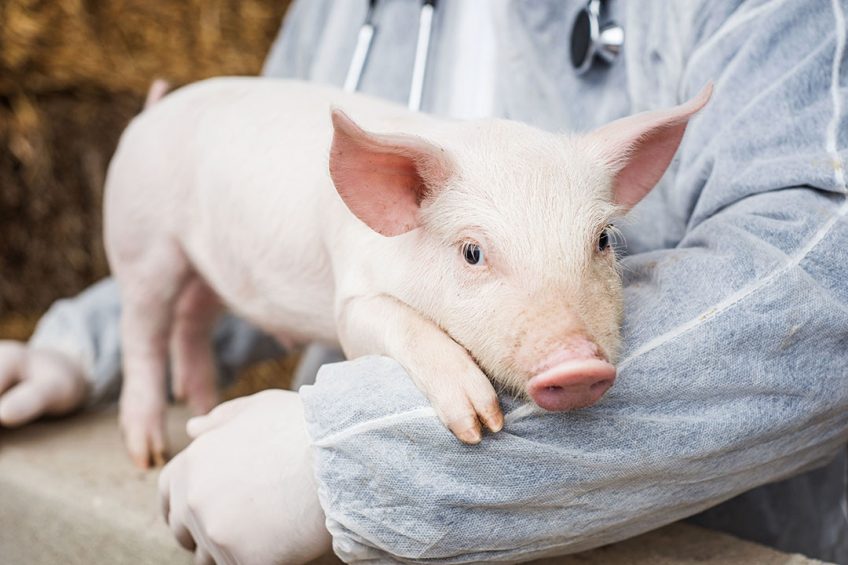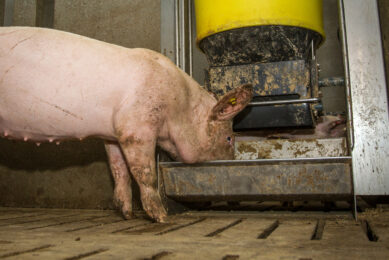Plant proteins can replace animal proteins

Nutritionists typically acknowledge animal protein as being a quality, highly digestible feed ingredient that is favoured for addition to diets for young animals. Over the years, however, plant-derived alternatives have emerged which lead to similar performance results.
In the past, fishmeal inclusion rates were considered optimal at around 10% for piglet and broiler feeds. Nowadays, however, most premium piglet feeds may contain only 5% of fishmeal and broiler pre-starter feeds containing any fishmeal are rare, especially when using high-quality products. It is projected that by 2025, fishmeal will be an exception in livestock diets. A similar tendency is probable for other animal protein sources.
In addition, there is often a variation in nutrients. Differences are relatively easy to analyse, but levels of biogenic amines are often hard to determine. Those are biologically active compounds synthesised from amino acids, which are occurring should animal protein be in a state of decomposition. Numerous studies have shown that feed-borne biogenic amines are toxic and cause a poor performance or even death in pigs and poultry.
Apart from these two reasons, another major reason is for the gradual disappearance of animal protein sources is a growing public and political concern about the safety of feeds with animal origin. In recent years, that concern has grown due to e.g. feed-borne bacterial infections, toxic compounds, veterinary drug residues and contamination. Animal protein can be connected with feed safety issues and shows a wide variety in quality. Examples are the possible contamination with dioxins, entero-bacteria, salmonella and E. coli.
Add to this the recent concern about the spread of African Swine Fever. At the moment, in some parts of the world, the use of animal products is being discouraged in the context of the virus’ emergence.
Switching to plant-based proteins
Plant-based proteins are a safe, and often cheaper, alternative. However, plant proteins are generally digested not as easily as animal proteins. Undigested protein will serve as a substrate for E. coli and Clostridia. For that reason, reduction of the crude protein content in diets has been applied to improve gut health, as an alternative strategy to using antibiotics. In the Netherlands, piglet weaning diets usually have crude protein levels of 16.5-17.5%.
Secondly, upgrading digestibility of plant protein sources is key to overcome this problem. Protein digestibility is of crucial importance in young animal nutrition. The animal’s performance – growth and efficiency – is largely related to protein levels and ileal digestibility. Standardised ileal digestibility (SID) represents an animal’s efficiency to use this protein source for growth, with close to 100% being very efficient. In short, a higher digestibility is desired, as that will induce growth, but also limits growth of harmful bacteria, reducing the incidence of diarrhoea – and as a result, antibiotic use.
Piglet research confirms in vitro data
Joosten Young Animal Nutrition, the Netherlands, manufactures and markets two plant-derived high-quality protein ingredients, designed for young animal nutrition. Characteristic for Joosten Protein Concentrate 56 (JPC 56) is its high level of glutamine, while Fishmeal Replacer Omega 3 (FMR Ω3) combines high levels of glutamine with omega-3 fatty acids as well.
These products value feed safety, promote gut health and have a high digestibility. In recent years, numerous in vitro lab digestibility tests have been performed on these approaches, showing average protein digestibility levels of 97%. Recently, an extensive research by Prof Dr Hans Stein at the University of Illinois, United States, was performed in cannulated weaning pigs to analyse in vivo digestibility of these protein concentrates in comparison with steam-dried Peruvian fishmeal. Where in vitro results are considered as a best estimate, in vivo testing provides the most accurate and ultimate testing of digestibility.
* JPC 56 (Joosten Young Animal Nutrition); ** FMR Ω3 (Joosten Young Animal Nutrition); ab indicates significance P<0.001.
The results of this research show an excellent protein digestibility (see Table 1), confirming historical in vitro data carried out by independent laboratories in the Netherlands and Denmark. Some take-away results from this research include:
• Crude protein levels for the protein concentrate, the fishmeal replacer as well as fishmeal were 55.4%, 58.1%, and 66.2% respectively;
• The apparent ileal digestibility (AID) of crude protein and all amino acids were lower (P < 0.05) in fishmeal compared with the 2 ingredients. The only exception was the amino acid alanine, where no difference was observed.
• The standardised ileal digestibility (SID) of crude protein and all amino acids were the lowest (P < 0.05) in fishmeal compared to the other two approaches (see Figure 1). Again, the exception was alanine; there only the protein concentrate had a higher SID (P < 0.05) than fishmeal.
Comparison with others
The values for SID of amino acids in fishmeal were intermediate between values published for North American fishmeal and European fishmeal. The SID values of crude protein for the two researched approaches are higher compared to other available protein concentrates, see Table 2.
Results analysed using the same method with cannulated weaned piglets at Illinois University in compliance with Prof Dr H. Stein*.
Designed for young animal nutrition
This research at the University of Illinois confirms better results of amino acid utilisation using the strategies described above and consequently a high level of safety for young animals. The fundamental research results are in line with technical performance improvements typically seen when using those protein concentrates in piglets and young poultry. The results demonstrate that this type of concentrates can successfully replace proteins from animal origin.











